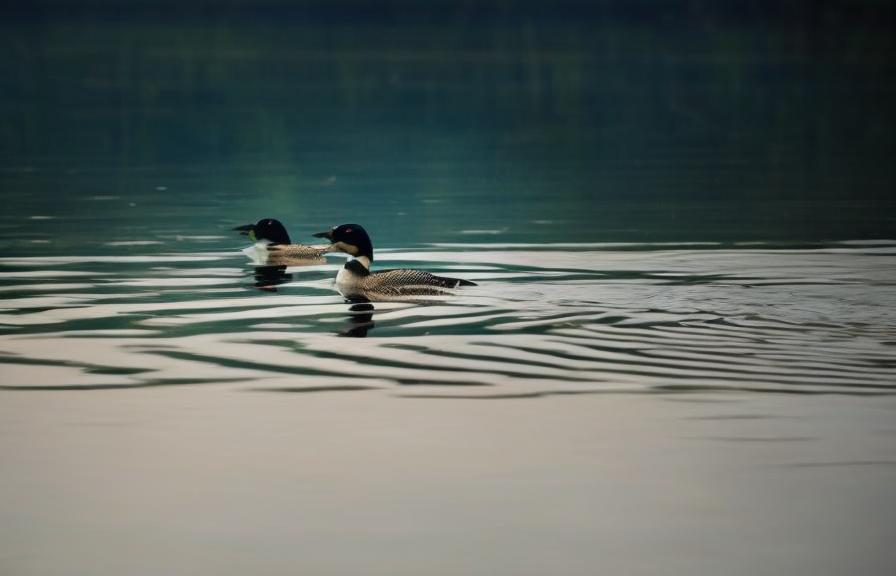Mandarin ducks, scientifically known as Aix galericulata, are one of the most beautiful and iconic species of ducks in the world. They are native to East Asia, particularly in China, Japan, Korea, and parts of Russia. The Mandarin duck is known for its stunning and vibrant plumage, with the male sporting a striking combination of orange, green, purple, and white feathers, while the female has a more subtle yet elegant appearance with a greyish-brown body and a white eye-ring. These ducks are highly revered in Asian cultures and are often associated with love, fidelity, and marital bliss. In fact, they are often referred to as “love ducks” and are a popular symbol of romance and devotion.
Mandarin ducks are typically found in densely wooded areas near rivers, lakes, and ponds, where they can find suitable nesting sites and abundant food sources. They are known for their graceful and agile swimming abilities, as well as their distinctive call, which is a soft whistle-like sound. These ducks are monogamous and form strong pair bonds during the breeding season, which typically occurs in the spring. The courtship displays of Mandarin ducks are a sight to behold, with the males performing elaborate dances and vocalizations to attract a mate. Overall, Mandarin ducks are not only visually stunning but also possess fascinating behaviors and characteristics that make them a truly captivating species.
Key Takeaways
- Mandarin ducks are known for their vibrant and colorful plumage, making them one of the most beautiful duck species in the world.
- During breeding season, male mandarin ducks display elaborate courtship behaviors to attract females, including head bobbing and calling.
- Female mandarin ducks select nesting sites in tree cavities near water bodies and lay an average of 9-12 eggs.
- The incubation period for mandarin duck eggs is around 28-30 days, and the ducklings are precocial, leaving the nest shortly after hatching.
- Both male and female mandarin ducks play an active role in protecting and caring for their ducklings, teaching them how to forage and avoid predators.
Characteristics and Behavior During Breeding Season
During the breeding season, male Mandarin ducks undergo a remarkable transformation in their appearance. Their already vibrant plumage becomes even more striking, with the colors becoming more intense and the ornate feathers on their wings and crest becoming more prominent. The males also become more vocal and active during this time, engaging in elaborate courtship displays to attract a mate. These displays often involve head-bobbing, wing-flapping, and vocalizations that are meant to impress the females. The females, on the other hand, become more selective during this time, carefully observing the males’ displays before choosing a mate.
Once a pair bond is formed, the male and female Mandarin ducks work together to find a suitable nesting site. They prefer nesting in tree cavities near water bodies, where they can find protection from predators and easy access to food. The female then begins to construct the nest using grasses, leaves, and down feathers to create a soft and insulated bed for her eggs. The male stands guard and keeps a watchful eye on the surroundings to ensure the safety of the nesting site. Overall, the breeding season brings out the most vibrant and active behaviors in Mandarin ducks as they prepare for the next generation.
Nesting and Egg-laying Process
Nesting is a crucial part of the breeding process for Mandarin ducks, as it provides a safe and secure environment for the female to lay her eggs and for the ducklings to hatch and grow. The female typically selects a tree cavity or a hollowed-out tree trunk near water to build her nest. She lines the nest with soft materials such as grass, leaves, and down feathers to create a cozy and insulated space for her eggs. The female may spend several days constructing the nest to ensure that it is well-protected and comfortable for her eggs.
Once the nest is ready, the female begins laying her eggs, usually at a rate of one egg per day until she has laid a full clutch. Mandarin duck clutches typically consist of 9-12 eggs, though this can vary depending on factors such as food availability and environmental conditions. The eggs are creamy-white in color and are about the size of a chicken’s egg. The female diligently tends to her eggs, keeping them warm and protected from predators while the male stands guard nearby. The egg-laying process is a critical stage in the breeding cycle of Mandarin ducks, as it sets the stage for the next phase of incubation and hatching.
Incubation and Hatching of Ducklings
After the female has laid her full clutch of eggs, she begins the process of incubating them to stimulate embryonic development and eventually hatch the ducklings. Incubation typically lasts for about 28-30 days, during which time the female remains dedicated to keeping her eggs warm and protected. She rarely leaves the nest during this period, relying on the male to bring her food so that she can conserve her energy for the task at hand.
As the incubation period nears its end, the eggs begin to hatch, and tiny ducklings emerge from their shells. The hatching process can take several hours or even days as each duckling struggles to break free from its egg. Once hatched, the ducklings are covered in down feathers and are able to move around and vocalize almost immediately. The female carefully tends to her brood, helping them dry off and encouraging them to leave the nest once they are strong enough. The hatching of ducklings marks an exciting milestone in the breeding cycle of Mandarin ducks and sets the stage for the next phase of parental care and protection.
Parental Care and Protection of Ducklings
After the ducklings have hatched, both the male and female Mandarin ducks play crucial roles in caring for and protecting their offspring. The female leads her brood to water shortly after hatching, where the ducklings can begin feeding on aquatic insects, small fish, and plants. The male remains close by, keeping a watchful eye on his family and fending off any potential threats or predators.
The female provides warmth and protection for her ducklings by allowing them to snuggle under her wings or body when they need to rest or stay warm. She also teaches them important skills such as foraging for food, preening their feathers, and avoiding danger. The male continues to stand guard and protect his family from potential threats such as predators or other competing ducks.
Overall, parental care is a collaborative effort between both parents as they work together to ensure the survival and well-being of their offspring. This period is crucial for the development of the ducklings as they learn essential skills that will prepare them for independence in the wild.
Challenges and Threats During Breeding Season

Despite their stunning appearance and dedicated parental care, Mandarin ducks face several challenges and threats during the breeding season that can impact their reproductive success. Habitat loss due to urbanization and deforestation has led to a decline in suitable nesting sites for these ducks. Additionally, pollution of water bodies can affect food availability for both adult ducks and their ducklings.
Predation is another significant threat during the breeding season, with predators such as raccoons, mink, and birds of prey posing a risk to both eggs and ducklings. Invasive species such as feral cats or non-native birds can also compete with Mandarin ducks for resources such as nesting sites or food.
Human disturbance is yet another challenge faced by Mandarin ducks during the breeding season. Nesting sites near human-populated areas may be subject to disturbance from activities such as boating, fishing, or recreational activities near water bodies. These disturbances can cause stress to nesting ducks and may even lead to nest abandonment or reduced reproductive success.
Conservation Efforts and Future Outlook
Conservation efforts play a crucial role in ensuring the future survival of Mandarin ducks in their native habitats. Efforts to protect and restore suitable nesting sites through habitat conservation and restoration projects can provide essential breeding grounds for these ducks. Additionally, measures to reduce pollution in water bodies can help ensure an adequate food supply for both adult ducks and their offspring.
Predator management programs can also help mitigate predation pressure on nesting Mandarin ducks by controlling populations of invasive predators or implementing measures to protect nests from predation. Public education and outreach programs can raise awareness about the importance of protecting nesting sites and minimizing human disturbance during the breeding season.
Overall, with concerted conservation efforts and continued research into their breeding behaviors and needs, there is hope for the future survival of Mandarin ducks in their native habitats. By addressing the challenges they face during the breeding season and implementing effective conservation strategies, we can ensure that these iconic birds continue to grace our waterways with their beauty for generations to come.
As the mandarin duck breeding season approaches, it’s important to ensure that their environment is conducive to successful breeding. In a related article on PoultryWizard, “What Should You Feed Ducks,” you can learn about the dietary needs of ducks during the breeding season and how it can impact their reproductive success. Providing the right nutrition is essential for mandarin ducks to thrive and produce healthy offspring. Check out the article for valuable insights on maintaining a healthy diet for your ducks during this crucial time.
FAQs
What is the breeding season for mandarin ducks?
The breeding season for mandarin ducks typically occurs from late February to early April.
Where do mandarin ducks breed?
Mandarin ducks breed in wooded areas near water, such as lakes, ponds, and rivers.
How do mandarin ducks attract mates during breeding season?
Male mandarin ducks attract mates by displaying their colorful plumage and performing elaborate courtship displays.
How many eggs do mandarin ducks typically lay during breeding season?
Mandarin ducks typically lay 9-12 eggs in a clutch, with the female incubating the eggs for about 28-30 days.
Do mandarin ducks mate for life?
Mandarin ducks are known for forming strong pair bonds during the breeding season, but they do not necessarily mate for life. They may form new pair bonds in subsequent breeding seasons.
Meet Walter, the feathered-friend fanatic of Florida! Nestled in the sunshine state, Walter struts through life with his feathered companions, clucking his way to happiness. With a coop that’s fancier than a five-star hotel, he’s the Don Juan of the chicken world. When he’s not teaching his hens to do the cha-cha, you’ll find him in a heated debate with his prized rooster, Sir Clucks-a-Lot. Walter’s poultry passion is no yolk; he’s the sunny-side-up guy you never knew you needed in your flock of friends!







